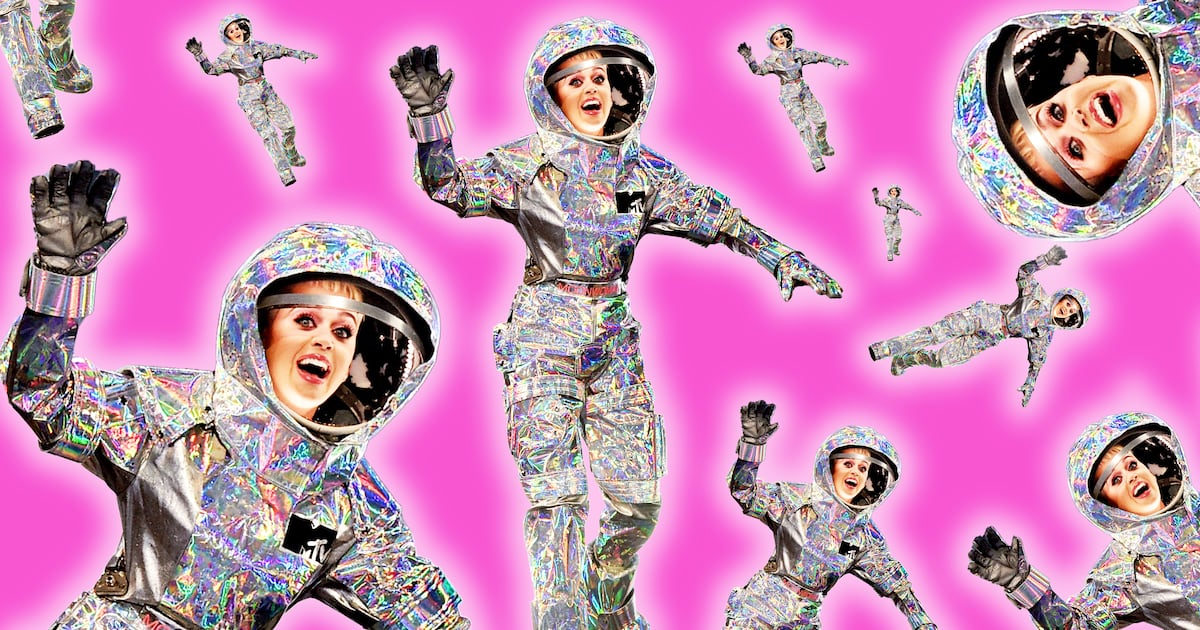Something extraordinary happens in the premiere of Netflix’s newest animated series, Dead End: Paranormal Park. Toward the episode’s end, our hero Barney (Zach Barack) walks through a hall of mirrors. He then stops, looks at his reflection, tussles his hair, and smiles.
This moment is brief and may sound superficial. But it’s loaded with meaning: There’s a trope of transgender characters looking longingly into mirrors, upset with what they see, and longing to be someone else. But Barney, who’s a teenage transgender man, feels the exact opposite. With just one quick smile, Dead End repudiates stereotypical representations of gender dysphoria. Instead, in front of that mirror, Barney feels pure euphoria. Like all of Dead End itself, this moment shows a coming-of-age trans person confidently loving who he is—a conceit that is as simple as it is radical.

Based on Hamish Steele’s graphic novel series DeadEndia, Dead End is an exquisite supernatural romp. The show follows Barney, co-worker/bestie Norma (Kody Kavitha), and Barney’s dog Pugsley (Alex Brightman) who are spending their summer working at a haunted theme park themed around actress Pauline Phoenix (Clinton Leupp, better known as Coco Peru). At the park lives Courtney (Emily Osment), the lovable one-thousand-year-old demon, who’s desperately trying to leave the human world behind for the demon realm. Demonic happenings and hauntings are commonplace here–it’s why Pugsley, Barney’s dog, can talk as he’s been partly infused with demon overlord Temeluchus’ spirit.
It’s an incredibly fun journey over the course of 10 episodes. It’s beautiful, too; Dead End looks like a comic book come to life, with bright, inviting colors and charming character designs filling every frame. The imagination behind the show is off-the-charts, and it's bursting at the seams with delectable wit. While Barney and his crew deal with a demonic game show, haunted mascots, and night-hags that turn kids into sleepless nightmares, Dead End manages the tricky balance of offering these heavy doses of supernatural escapism with genuine heart.
While the entire cast of characters in Dead End is wonderful (and wonderfully diverse), I couldn’t stop thinking about Barney most of all. Laws limiting the rights of LGBT+ people are on the rise around the world, and the prominence of anti-trans rhetoric (especially in the US and UK) is deeply distressing. Which is why it feels like something of a miracle that Dead End is coming out now, at a time as fraught as this one.
Barney’s gender identity is never questioned or challenged at any point in the series. Although being trans is an important part of who Barney is, it doesn’t define him. Instead, Dead End emphasizes that Barney’s growing pains are related to his age, not his gender or sexual orientation.
He deals with the same kind of awkwardness in making friends and catching feelings as every other teenager does. Barney and his crush Logs (Kenny Tran), who also works at the park, are full of adorably nervous energy as they figure out their feelings for each other—likely a familiar experience to anyone of any identity. What is most joyously unexpected is how they finally come together: in a spectacular all-musical episode (with songs from Fall Out Boy frontman Patrick Stump).
But Dead End doesn’t ignore Barney’s trans-ness, either. When he first tells Norma that he’s trans while they’re at work, he adds that the park “is the first place I’ve ever felt like I could just truly be myself ... I can just be Barney, and I can choose if and when I tell people.”

Any queer person can relate to what it means to have control over your identity and the unique joy that comes from living as your authentic self entirely on your own terms. For Barney to be a trans teen in an animated show expressing this sentiment feels even more special; mainstream animation rarely gets the chance to delve into these types of characters.
Dead End is a visually sublime, hugely entertaining and deeply heartfelt reminder of something that a nasty and widespread moral and legislative panic tries to make us forget: Trans men are men, trans women are women, and all that anybody wants is the right to live authentically. Sometimes, the most courageous thing you can do is live openly and honestly as yourself. That Dead End also happens to be one of 2022’s best new shows is just icing on the cake.







